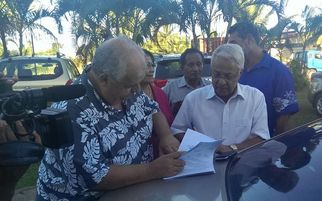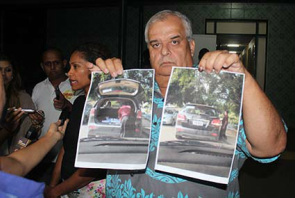
Professor Wadan Narsey
Saturday, August 02, 2014
Fiji Times
The only real possibility of "vote rigging" will be if results from polling stations are systematically changed in the reporting to the central Elections Office
Many anonymous bloggers are already alleging the Bainimarama Government will be rigging the forthcoming September 2014 election.
Such allegations have been made before, and despite being unsubstantiated, have had disastrous results, politically and economically, and must be guarded against.
Here I take you back to the last 2006 election where soon after the results were announced, the Fiji Labour Party (FLP) claimed that they had been cheated of victory by SDL's electoral fraud.
This electoral fraud claim was then used by Bainimarama, as one of his justifications for the 2006 coup. But when the Leader of the FLP and a few of his colleagues joined Bainimarama's government, none of them produced any significant evidence of electoral fraud, despite being in government for more than a year
Neither was there any significant evidence of electoral fraud produced by the director of the Human Rights Commission, Dr Shaista Shameem, who financed and propagated a report on the elections by Dr James Anthony.
Nevertheless, the claims of electoral fraud have been believed by many Indo-Fijians and the allegations never retracted to this day, and even repeated by Bainimarama for seven years.
It is therefore useful to re-look at the voting numbers from 2006, and from 2001 and 1999, to see what lessons they hold for guarding against electoral fraud in the 2014 elections.
In a box, I list a number of 2006 allegations which political parties, candidates and voters can think about to consider their relevance for the September 2014 elections.
(This paper is drawn from a longer submission I had made to the Yash Ghai Commission).
Possible indicators of electoral fraud
Given the majority of SVT and SDL supporters were iTaukei, and the majority of supporters for the Fiji Labour Party were Fijians of Indian descent, there were two possible ethnicity-based indicators of possible electoral fraud in 1999, 2001 and 2006:
m Were the numbers of registered iTaukei voters higher than the potential numbers of voters indicated by population projections, and higher than the Fijian of Indian descent proportion? and
m Was the proportion of registered iTaukei voting systematically higher than the similar proportion for Fijians of Indian descent?
These two questions can be examined in aggregate for Fiji, or at the level of individual constituencies.
The electoral results suggest completely the opposite of the allegations.
The 2007 Census data and potential voters
One can work backwards from the 2007 Census results to estimate the numbers of potential voters for 2006 by reducing the iTaukei number by 1.9 per cent (that is the annual growth rate of iTaukei voters) and by reducing the Fijian of Indian descent number by a smaller 0.1 per cent, the growth rate of Fijian voters of Indian descent.
Table 1 gives the results for percent. of potential voters who were registered by ethnicity.
The last row indicates that a lower 98 per cent of eligible iTaukei voters were actually registered than the 99 per cent of Fijians of Indian descent, but both were pretty close to 100 per cent.
It is highly unlikely hordes of non-existent iTaukei voters had been registered by the SDL in order to swamp the Fijians of Indian descent vote.
And regardless of the excessive numbers of ballot papers had apparently been printed, what percentage of those registered voters actually voted?
The last row of Table 2 tells you a lower 87 per cent of registered iTaukei voters voted in 2006, compared with 89 per cent of registered Fijians of Indian descent.
A higher proportion of potential Fijian voters of Indian descent were registered than iTaukei. And a higher proportion of registered Fijian voters of Indian descent actually voted, than iTaukei. This was true in all the last three elections: 1999, 2001 and in 2006 as indicated by Table 3.
In all these elections, the election turnout of Fijians of Indian descent was higher than that of the iTaukei and Others.
It was highly unlikely that numbers of iTaukei voting were in any way artificially inflated by either SVT or SDL.
Both ethnic communities saw much lower proportions voting in 2001 (soon after the 2000 coup) than in either 2001 or 2006.
But what about at the individual constituency level, where there was one strange anomaly of more people voting than voters actually registered?
One small constituency irregularity
There was only one odd result in the 2006 elections, in the Cakaudrove East constituency where there were some 7587 voters registered and 7639 voters actually voted, with the "extra" votes amounting to a mere 52 voters (Table 4).
This was hardly evidence of electoral fraud, for two reasons.
First, one can easily imagine rural areas where some iTaukei voters may have just gone to the wrong polling booths.
In fact, right alongside Cakaudrove East was another Fijian constituency, Cakaudrove West, where a massive 1987 registered iTaukei voters did not vote, or more likely, some of them may have incorrectly voted in Cakaudrove East.
Second, note that the SDL won Cakaudrove East by a massive margin of 5353 votes over all the other parties combined. The 52 extra votes was a drop in bucket and no one with any common sense would suppose that SDL would have even bothered to cheat in that constituency.
Unlike the current electoral system, in 2006, having extra votes in any one constituency is no help whatsoever to winning in any other constituency.
Yet allegations of electoral fraud without an iota of evidence have continued to be made and believed by Fijians of Indian descent.
They believe what they want to
Most Fijians of Indian descent still believe the FLP's allegations of electoral fraud in 2001 and 2006, although no such allegation was made about the 1999 elections when they won.
One can understand their suspicions given that twice, in 1987 and 2000, coups removed their political leaders from control of government, with systemic violence directed against them.
There is little doubt that FLP's allegations of electoral fraud against SDL undermined national and international confidence in the resulting SDL/FLP multi-party government, and helped to justify the 2006 Bainimarama coup
This "bitterness factor" may have ironically encouraged the FLP leader (and other Fijian leaders of Indian descent) to join the Bainimarama Government after the 2006 coup, however unethical it seemed to neutral observers.
The irony is that eight years later, the same FLP is in partnership with SODELPA (the successor to SDL) fighting the elections against the Bainimarama Government's Fiji First party.
There is little doubt that had all the lawfully elected governments been allowed to continue their full terms in 1987, 2000 and 2006, they would have accelerated economic growth to levels achieved by other comparable countries such as Mauritius and Singapore, and allowed many progressive social policies for Fiji such as in education and health.
Fiji faces the same problem today.
Should the Fiji First party win a surprisingly large number of seats in September, how likely is it that there will once again be:
* allegations of electoral fraud;
* undermining local and international confidence in the legitimacy of the elections outcome fuelling further political instability;
* further undermining investor confidence; and
* and once again reducing economic growth?
Lessons for the 2014 Elections
In the previous elections with 71 separate constituencies, if there were close results in any one of them, then a few hundred votes rigged this way and that, could have made a difference to that particular constituency result, and the overall national tally of political parties.
But for the September 2014 elections, there is only one national constituency and the number of seats for each party will [be] decided by its share of total votes in aggregate.
Very differently from previous elections, fiddling or vote-rigging a few hundred votes here and there in some polling station, will not make any significant difference to the final aggregate votes and seats received by each political party.
An honest and efficient Elections Office will easily pick up any electoral fraud.
The September 2014 voter rolls are all computerised and voters will only be able to vote at their designated polling stations.
The two mobile phone companies, Digicel and Vodafone, have agreed to provide an extremely helpful free SMS service which has significantly reduced the headache and transport costs for voters having to find which polling station they are supposed to vote at, still a costly exercise for those not having access to a mobile phone - that Elections Office officials and political party workers can try and remedy.
Since there are no numbers of voters based on constituencies or ethnicity, such checks will be no longer possible, only aggregate numbers of total potential voters, total registered and total voting.
But there will be no difficulty in picking up if more persons have voted than are registered at any of these polling stations, or if there are systemic biases in percentages voting at each polling station, favouring some political party or other.
The only real possibility of "vote rigging" will be if results from polling stations are systematically changed in the reporting to the central Elections Office.
Political parties, NGOs and international observers must therefore make sure that they
(a) closely monitor the counting of votes for each candidate at as many of the polling stations as possible, and
(b) check their results with what is eventually put out by the Elections Office.
* These are the views of Professor Wadan Narsey and not of The Fiji Times. Professor Narsey was a parliamentarian from 1996 to 1999 after which he has had no political affiliation. He has stated to The Fiji Times he is not aligned to any political party



